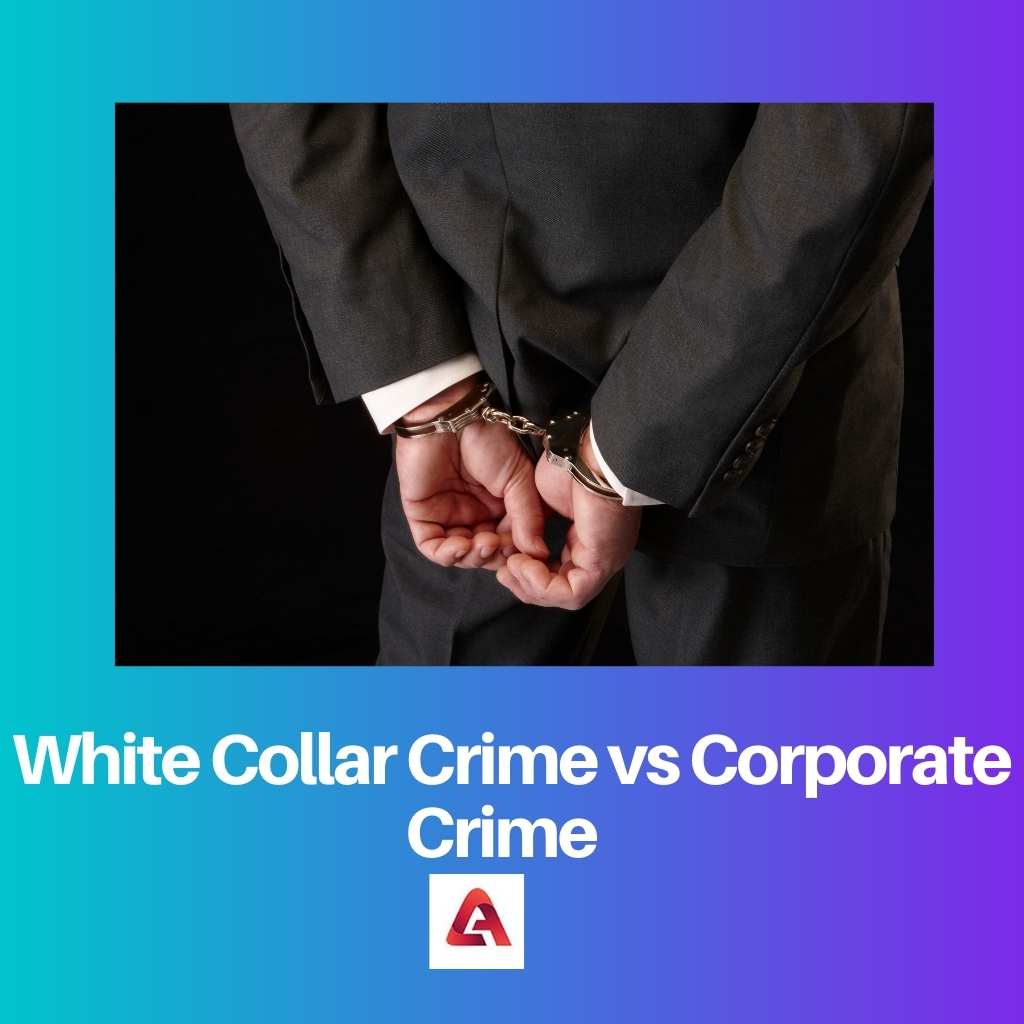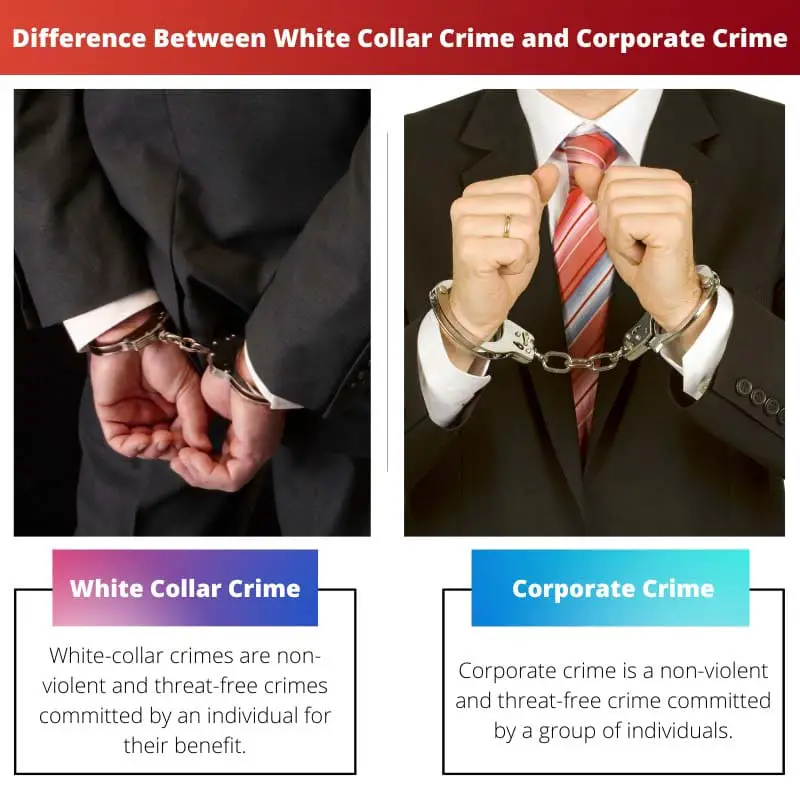The world has become a dangerous place to live. Nowadays, none of the places people go can be declared 100% safe because of the crimes and injustices committed by individuals or groups against the innocent.
People commit crimes for various reasons, such as grudges, revenge, benefits, fun, or simply because they are psychopaths.
However, crimes can range from trivial to heinous crimes. Two such types of crimes are white-collar crime and corporate crime.
Key Takeaways
- The white-collar crime involves non-violent, financially motivated offenses committed by individuals, while corporate crime encompasses illegal business actions.
- Corporate crime can affect more victims than white-collar crime due to its organizational scale.
- Both types of crime can result in significant financial losses and damage public trust.
White Collar Crime vs Corporate Crime
The difference between white-collar crime and corporate crime is that white-collar crimes are committed to satisfying a person’s desires in the form of financial benefits. On the other hand, corporate crimes are committed so that a group of people, in the form of firms or companies, can derive benefit from them. An individual who indulges in a white-collar crime has to face the repercussions of being caught on their own, whereas a corporate crime will be committed by a person working in the company. Repercussions have to be faced by the business or agency.

White-collar crimes are crimes that are free from any brutality or heinous acts and do not involve threats. It is by the conduct of misuse of authority or trust.
People commencing White Collar Crime are individuals that commit it on the drive of getting financial benefits. Corporate crime is another sort of non-violent and threat-free crime conducted by a group of people for the sake of their company.
Corporate crime is called organizational crime. Employees commencing such crimes do not hold themselves as fraud nor think of their actions as poor.
Comparison Table
| Parameters of Comparison | White Collar Crime | Corporate Crime |
|---|---|---|
| Definition | White-collar crimes are non-violent and threat-free crimes committed by an individual for their benefit. | Corporate crime is a non-violent and threat-free crime committed by a group of individuals. |
| Purpose | White-collar crimes are committed by individuals for their gains. | Corporate crime is committed for the benefit of the company or organization. |
| Motivation | The motivational drive of white-collar crime is the financial gains attached to it. | The motivation driving corporate crime is the upliftment of the company that the group of individuals is working. |
| Penalties | People commencing White Collar Crime may face penalties or fines, imprisonment, or have their license canceled by authorities. | The group of individuals committing a corporate crime may have their company fined big time. |
| Repercussions | The repercussions are faced by the one committing the crime. | The repercussions are not faced by the people who committed the act. |
| Concept | White-collar crime is the type of crime that is broader in concept and is inclusive of corporate crime. | Corporate crime is a narrow concept. |
What is White Collar Crime?
“White collar crimes” are crimes that do not include threats and are free from any brutality. It is frequently accomplished through the abuse of power or trust.
White-collar crime is started by people who are looking for financial gain. The five most common forms of white-collar crime committed are
- Corporate Fraud
- Bankruptcy fraud
- Extortion
- Ponzi Schemes
- Embezzlement
Although white-collar crimes are violence and threat-free, they put the lives of employees in danger in the form of poor working conditions and consumers in danger in the form of low-graded quality substances, thus causing various problems for society. Researchers have said that white-collar crimes cause more impact on the economy in terms of losses in comparison to other crimes.
“White-collar crime” was first brought into existence in the early 20th century by Edwin Sutherland. He was a sociologist and a criminologist.
He used the phrase to describe crimes that were commonly committed by people holding high dignity in society.
What is Corporate Crime?
Another sort of non-violent and threat-free crime is a corporate crime, which is committed by a group of people for the profit of their company. Organizational crime is another term for corporate criminality.
Employees who commit such crimes do not regard themselves as fraudsters or criminals, nor do they consider their actions wrong. Corporate crime is a narrower concept than falls under white-collar crime.
Although it is a person within the company committing a white-collar crime, the person does not receive the penalty or face punishment. Instead, it is the company that faces the repercussions and has to pay a huge sum of money as penalty money.
The company may be asked to change its rules and regulations so that they do not violate the law. Corporate criminals are created because of the opportunities available to them in the normal legitimate functioning of the organization that they work.
Some common types of corporate crimes are as follows:
- Corruption
- Cheating on employees
- Fraudulence on customer and vendor
- Scams related to investment
Main Differences Between White Collar Crime and Corporate Crime
- White-collar crimes are a type of crime that is commenced by individuals, while corporate crimes are conducted by a group of people.
- White-collar crimes are conducted by individuals for their benefit, while corporate crimes are conducted by groups of people for the benefit of their organization.
- In white-collar crime, if caught, the penalty is faced by the individual. However, in corporate crime, even though a particular person may be committing the crime, the penalty is faced by the company.
- As a result of committing a white-collar crime, an individual may be sentenced to prison for a few years, fined, or have their license canceled. While in corporate crime, the company may face a heavy fine and be asked to change its rules and policies.
- “White-collar crime” is a comprehensive and extensive concept in comparison to corporate crime. While corporate crime is a narrower concept.

- https://books.google.com/books?hl=en&lr=&id=HHsWm1xYvEEC&oi=fnd&pg=PA78&dq=White+Collar+Crime+and+Corporate+Crime&ots=5q16Eybaxo&sig=EAymkXCMWFmhvmEniA6_LfsZjOQ
- https://link.springer.com/content/pdf/10.1007/978-0-387-34111-8.pdf
